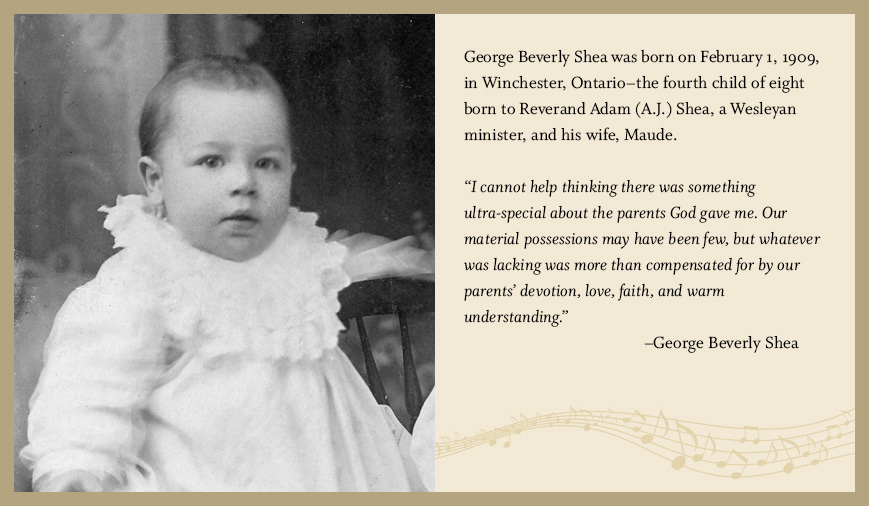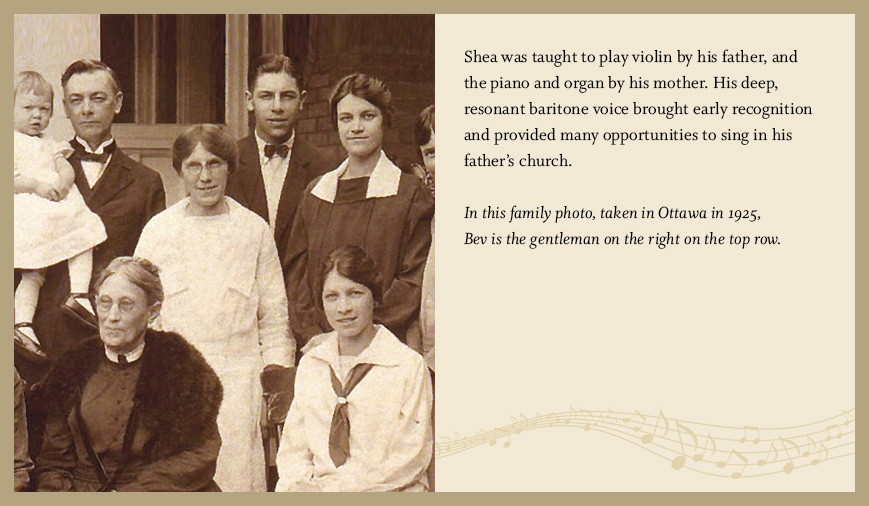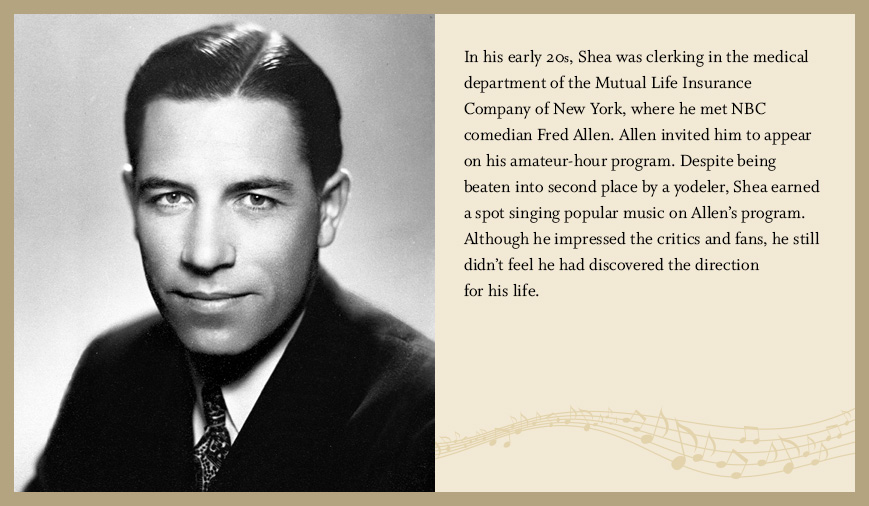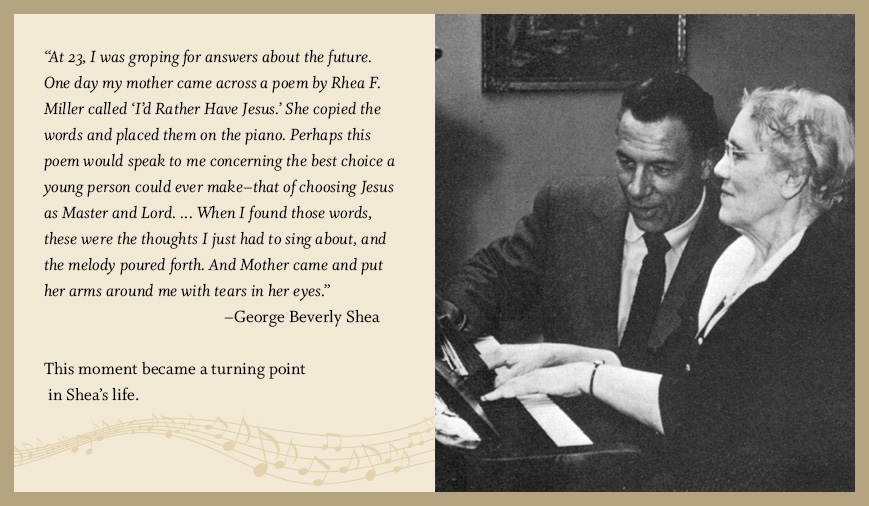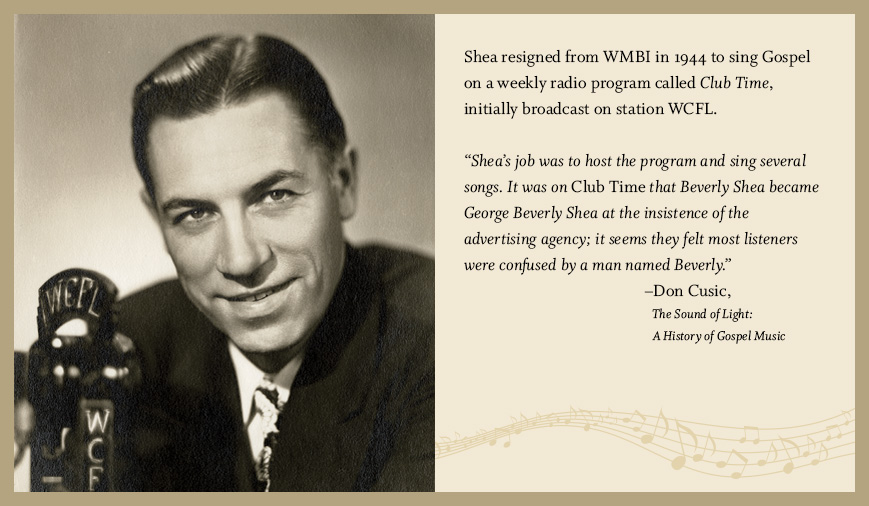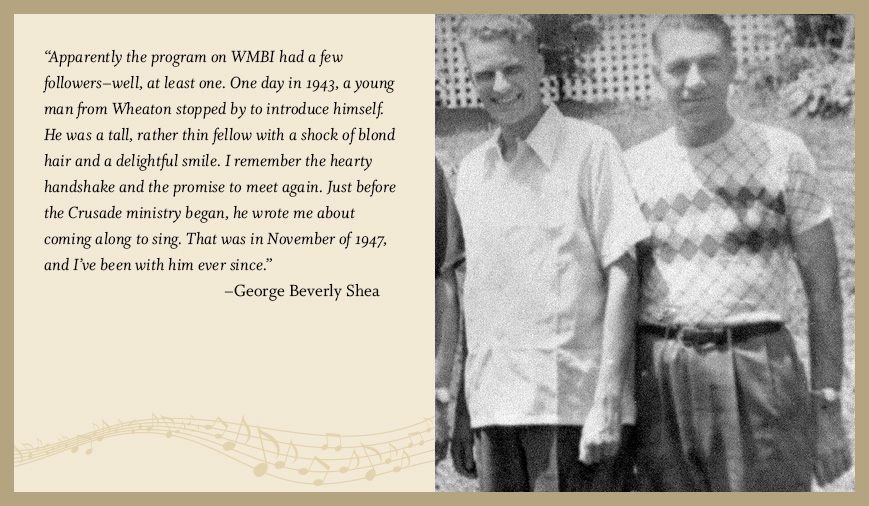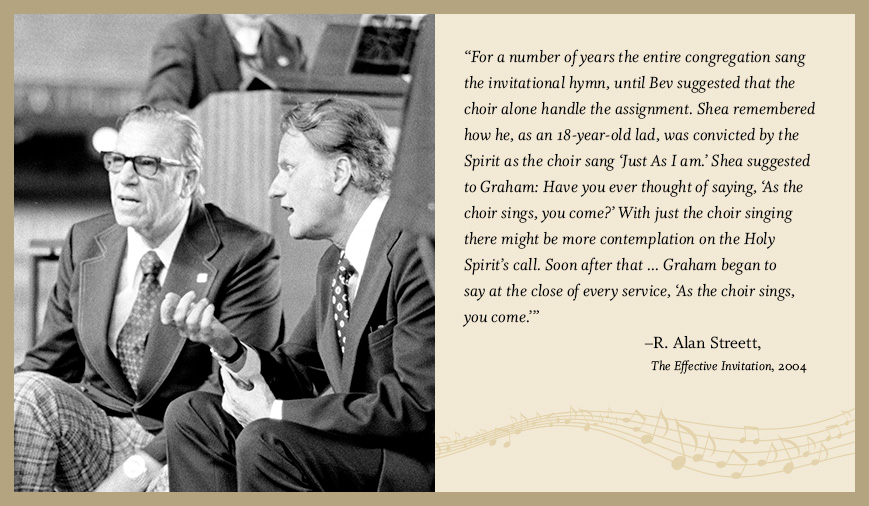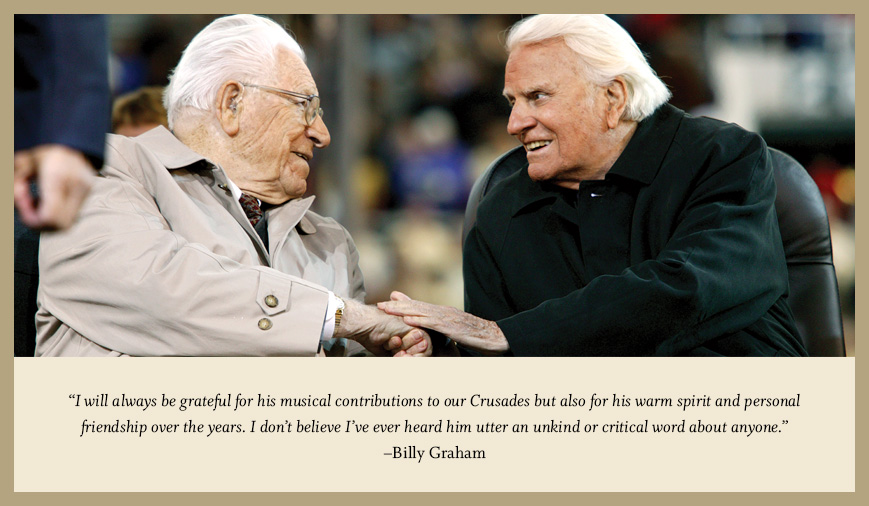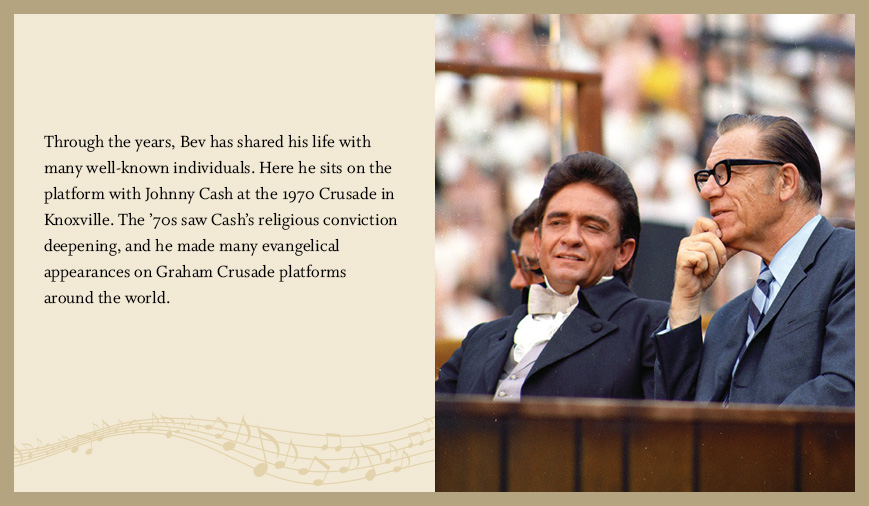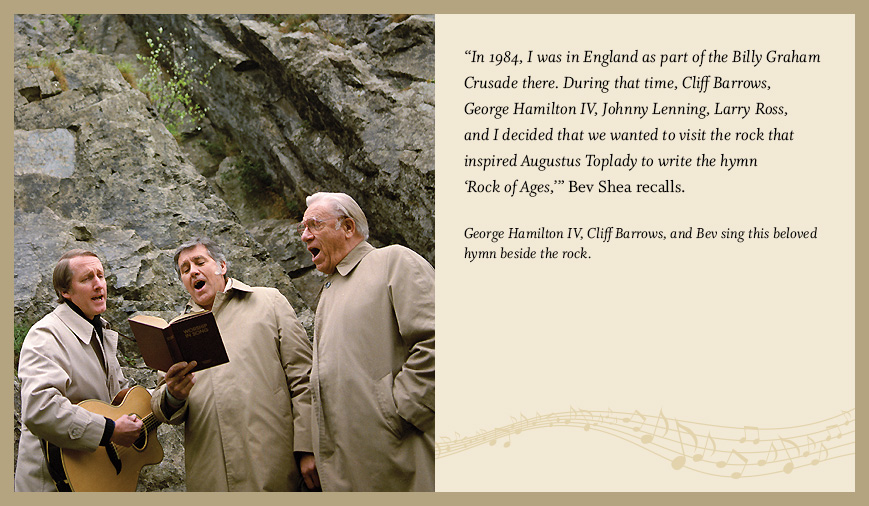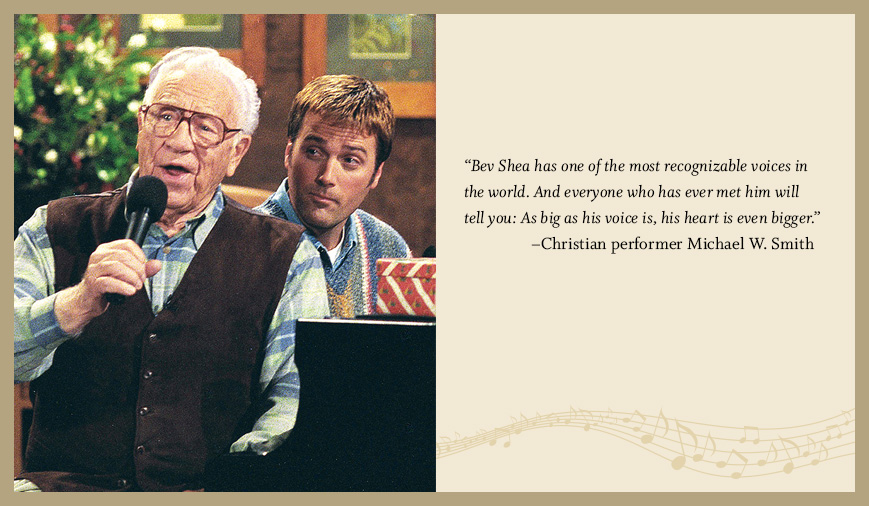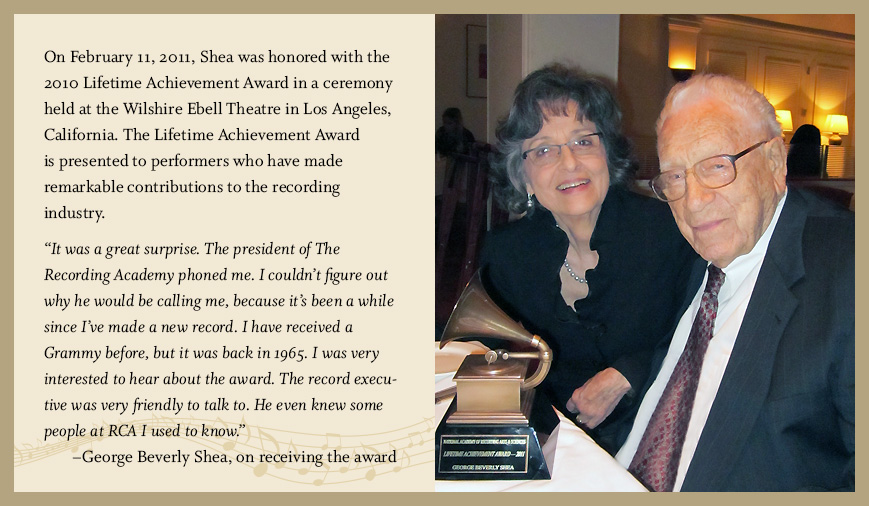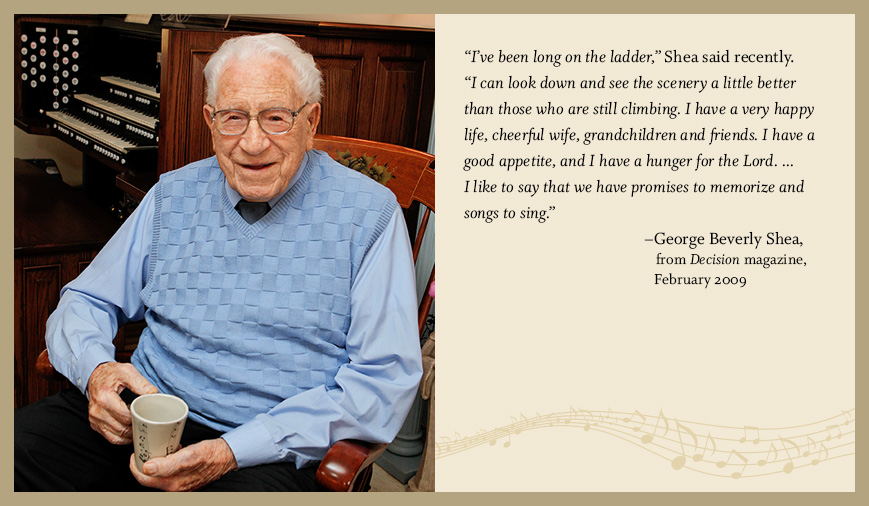George Beverly Shea, affectionately known as “America’s Beloved Gospel Singer,” turned 104 on February 1. Here, his son and wife recall fond memories of Mr. Shea and talk about his impact on the world. The Billy Graham Library will honor Mr. Shea in a special exhibit through March 31. This feature was originally published on the Billy Graham Evangelistic Association website and is reprinted by permission.
“Dad, how do I describe what you do?”
Ron Shea was asked in grade school to define his father’s profession. But how does a kid put into a few words the career of a renowned Gospel singer and composer who holds the world record for singing–in person–to the most people ever?
George Beverly Shea was born in 1909 in Winchester, Ontario, to a minister and his wife. The beloved performer, who turned 104 on Feb. 1, spent most of his life singing and writing songs for Billy Graham’s Crusades.

Cliff Barrows, George Beverly Shea and Billy Graham get busy decorating a Christmas tree in this undated photo from the Billy Graham.org website
“When we started out, the people came to hear Bev Shea sing,” Mr. Graham said in 1989. “They’d have in all the advertising, big letters … ‘Beverly Shea,’ and then way down there in small letters ‘Billy Graham will preach.’”
Ron remembers those Crusades well. He often attended in the summer when he was out of school. He also watched his dad play the piano and organ at home.
“I play the radio,” Ron said, confessing his lack of musical talent. He once “got fired” from piano lessons for being too rambunctious.
http://www.youtube.com/watch?v=aJywj9E4MBQ
George Beverly Shea, ‘I’d Rather Have Jesus’
http://www.youtube.com/watch?v=-ZbpyOc2lcY
George Beverly Shea sings Stuart Hamblen’s ‘It Is No Secret’ (1975)
Ron now works in donor ministries at the Billy Graham Evangelistic Association. Sometimes he talks to donors who recognize his last name.
Although his father firmly stuck to hymns, Mr. Shea has impacted people from all walks of life, most notably for his rendition of “How Great Thou Art,” a song later recorded by Elvis and Willie Nelson.
Mr. Shea is also well known for writing “The Wonder of It All” and co-writing “I’d Rather Have Jesus.”
http://www.youtube.com/watch?v=BL1vUY_qu-E
George Beverly Shea, ‘How Great Thou Art’ (1961)
http://www.youtube.com/watch?v=Dg7bkS8jdQM
George Beverly Shea, ‘Then Jesus Came’ (1962)
“I’ve been listening to Bev Shea sing for more than 50 years,” Billy Graham once said, “and I would still rather hear him sing than anyone else I know.”
Mr. Shea first met Mr. Graham who was pastoring the Village Church of Western Springs in Illinois–his only full-time pastorate–in 1940. Mr. Graham was 21, and Mr. Shea was 31.
Mr. Shea first sang for him on the Chicago program “Songs in the Night” in 1943, and by the late 1940s, the pair–along with music and program director Cliff Barrows, formed the heart of Mr. Graham’s ministry. It was in Mr. Graham’s hometown of Charlotte, NC, that Mr. Shea sang in the first of many citywide Crusades.
Mr. Graham and his late wife, Ruth Bell Graham, didn’t just treasure Mr. Shea’s friendship, but played the role of cupid to Mr. Shea and his second wife, Karlene. His first wife, Erma, died in 1976.
“I used to say that when God conceived the idea of husbands, that Bev was the mold,” Karlene said.
http://www.youtube.com/watch?v=Yo606Y43pwE
George Beverly Shea, ‘Oh What a Wonderful Savior’ (1983)
http://www.youtube.com/watch?v=DDMqlwsfa2k
George Beverly Shea and the Billy Graham Crusade Choir offer ‘Surely Goodness and Mercy’ (1967).
Back in the ’80s, Karlene worked in Mr. Graham’s office in Montreat, N.C. Mr. Shea would come and go and also sang at her church. They married in 1986 in the Grahams’ home.
“He has five organs and a piano,” Karlene said. “Every time he gives an organ away, another one finds its way into the house.” He still plays them on occasion.
The couple shares a home in Montreat. Karlene said her husband regularly breaks out into hymns and knows all the verses. She sings only when she’s alone.
“By the time you reach 100 years of age, you have a lot of friends,” she said. Mr. Shea used to answer his own letters–typing them up on the computer–but now he sticks to phone calls and entertains visitors. Young musicians come by for inspiration and advice.
Mr. Shea was also an inspiration to countless households during World War II. He worked in radio as an announcer and Gospel singer and helped boost the morale. He had a special song for the troops.
http://www.youtube.com/watch?v=cpqKYgVTr5M
George Beverly Shea, ‘Sweet Hour of Prayer.’ The lyrics were written by a blind preacher named W.W. Walford, who was described by his fellow clergyman Rev. Thomas Salmon as ‘a man of obscure birth and connections and no education, but of strong mind and most retentive memory.’ Walford’s words were published in the New York Observer’s September 13, 1845 edition, and in 1860 or 1861 were set to music by William Batchelder Bradbury. The song ‘Sweet Hour of Prayer’ was first published in a Methodist hymnal in 1878.
http://www.youtube.com/watch?v=ouWsJr0NElU
George Beverly Shea and the Billy Graham Crusade Choir, ‘The Lord’s Prayer’ (1963)
With all the pre-Crusade concerts and all the concerts between Crusades, Karlene said, the pair has traveled quite a bit over the years. The best part, she said, was meeting fellow Christians wherever they went.
“People would come out of the woodwork and hug him,” she said. Once, the couple was on a plane and the pilot came back to see Mr. Shea.
“He’s a very gentle man,” Ron said. “I’ve never heard him talk negatively about anybody.” He now has a word to describe his father–“gregarious”–but remembers seeing him on his knees by the bed at night, praying. “It wasn’t a showy thing. It was just a point of surrender to the Lord.”
Mr. Shea has taken that simple faith to every continent, and his bass-baritone voice is now recognized all over the world. He has been nominated for 10 Grammys, won two, and recorded more than 70 albums, including nine CDs. He has received several acknowledgments for his work, including his induction into the Religious Broadcasting Hall of Fame in 1996. He was honored with the Lifetime Achievement Grammy Award in 2011.
http://www.youtube.com/watch?v=6zWNwwk7hAc
George Beverly Shea, ‘The Love of God’ (1963)
And yet, Mr. Shea has never lost sight of the One he sings about. One of his best-known songs, “I’d Rather Have Jesus,” says it all. He composed the music at his mother’s piano in just one day at age 23 and later sang it at Crusades around the world–in Mandarin, Swedish, Finnish, Spanish and Japanese.
I’d rather have Jesus than silver or gold;
I’d rather be His than have riches untold;
I’d rather have Jesus than houses or lands,
I’d rather be led by His nail-pierced hand.
The Billy Graham Library is hosting an exhibit in tribute to George Beverly Shea through March 31. The exhibit includes family photos, awards and the piano his mother taught him to play on–the same piano on which he composed “I’d Rather Have Jesus.”
The Library is located at 4330 Westmont Drive, Charlotte, NC, off Billy Graham Parkway, near the Charlotte Douglas International Airport, I-77 and I-85. Click here to go to the Billy Graham Library page featuring a map and directions to the Library site.
PROMISES TO MEMORIZE AND WORDS TO SING
A Century-Plus of George Beverly Shea
‘I have learned to look up. And He’s there.’
Born in Winchester, Ontario, Canada, George Beverly Shea was the third son of the Rev. Adam Joseph Shea, a Methodist minister, and his wife, Maude Mary Theodora (Whitney) Shea. He became a Christian in his childhood years and re-dedicated his life to Christ when he was 18. His father taught him to play violin, his mother taught him the fundamentals of piano and organ, but singing was always his first love. Blessed with a resonant baritone voice that grew richer and deeper with age, Beverly Shea began singing at religious meetings in Ottawa Valley and studied singing with Herman Baker at Houghton College in Houghton, NY.
After college Shea took a job in the medical department of the New York City offices of Mutual of New York Life Insurance Company, where he spent nine years. During his tenure at Mutual, he took second place (losing out to a yodeler) on an amateur hour program hosted by comedian Fred Allen on NBC Radio, which led to an offer to sing on Allen’s own show. He was a hit with critics, as was the case when he moved to Your Hit Parade and put his stamp on the day’s most popular pop songs.
Uncomfortable performing secular material, Shea accepted a spot singing hymns on the radio show Meditations in Psalms, broadcast on New York City’s WMCA and also appeared on a gospel show emanating from Jersey City, NJ, and another, Young People’s Church of the Air, from Philadelphia. During this time he was also signed by Decca Records and made his first recordings: “Jesus Whispers Peace,” “Lead Me Gently Home, Father,” “I’d Rather Have Jesus” (a hymn he co-wrote) and “God Understands.”
After being recruited by Dr. Will Houghton, president of Moody Bible Institute (MBI), Shea took a staff position entailing multiple responsibilities with WMBI, America’s first non-commercial Christian radio station, owned and operated by the Moody Bible Institute. Immediately popular with listeners, he sang on three different WMBI shows. On January 2, 1944 he was offered a featured spot on the Billy Graham weekly radio program Songs in the Night, which aired on Sunday night for 45 minutes starting at 10:15 p.m. on WCFL out of Chicago. Shea’s appeal was such that Graham’s struggling show became self-sustaining within a matter of weeks.
For a few years thereafter Shea appeared on various other radio stations (including one on the Armed Forces Network), signed with the Singspiration Sacred Recordings label and occasionally crossed paths with Rev. Graham, including, in 1942, Christian youth meetings in Chicago that were instrumental in the formation of the Youth For Christ organization.
In 1947 Shea became one of the cornerstones of the team Rev. Graham was assembling to direct the Billy Graham Evangelical Association (BGEA), along with Cliff Barrows, and Grady and George Wilson. Barrows and Shea took charge of the Graham Crusades’ music.
In a 2007 interview with Dan Wooding for Christians Unite.com, Shea recalled his pivotal encounter with Rev. Graham:
“I had worked for 10 years during the Twenties in New York in the medical department of the Mutual Life Insurance Company. During that time, I met Dr. Houghton, Pastor of Calvary Baptist Church, and he heard me sing a few songs. Then he was transferred to Chicago to become the president of Moody Bible Institute and we met again at a Bible conference in Pennsylvania. He said, ‘I’d like to ask you if you have ever considered Christian broadcasting. I told him that I didn’t know it was available. That’s how it went in 1939. I accepted and went to Chicago, staying there five and a half years.
“One morning, there was a rap on my office door. I looked out and there was a tall young man with blond hair and we shook hands. He was 21 and I was 31. It was Billy Graham and he had traveled in from Wheaton College on a train just to say ‘hello.’ He said he listened to my morning hymn show called ‘Hymns From The Chapel.’ That’s how we first got acquainted.
“I came into this work with Mr. Graham in 1947 after we had exchanged letters and talked on the phone. He said he wanted me to be his gospel singer. I thanked him, but told him the only gospel singers I’ve ever heard about would sing a verse or two and stop and talk awhile. ‘Would I have to do that?’ I asked him. He chuckled and said, ‘I hope not.’
With that, I said, ‘Well, I’d like to come with you. That was in November of 1947 and I’ve been with him ever since.”
As the Billy Graham Crusades evolved, Shea became a dominant force in the worship ceremony and made songs such as “How Great Thou Art”—a poem of nine verses written by Carl Boberg of Sweden in 1885, published in 1886, then set to the melody of an old Swedish folk song and sung in public for the first time in 1888—seem as if they originated with him. Author Ace Collins has described the synergy between song and sermon at the Crusades thusly: “Shea’s solos set the tone for the preacher’s messages. With his full, rich baritone Shea not only charmed audiences, he also touched them with the message of each song he chose. Graham said that Shea always prepared his crowds by singing before the message, and he felt the song was more powerful than the sermon.”
Estimates are that Shea has sung live before some 220 million people, a Guinness world record. His recording career encompasses more than 70 albums and some 500 recorded vocal solos. He’s also written four books, including his autobiography, Then Sings My Soul (1968), and appeared in five films, the most recent being The New Orleans Story, a 2008 documentary about the impact of Hurricane Katrina on the Crescent City. He has a few closets full of awards (includlng a Grammy in 1966 for Best Gospel or Other Religious Recording for his album Southland Favorites with the Anita Kerr Quartet) and honorary doctorates from his alma mater, Houghton College and Trinity College (now Trinity International University) of Deerfield, IL.
In a 2001 interview with reporter Jim Dailey for Decision Magazine, Shea admitted to sometimes feeling ineffective in his role with the Graham Crusades, but leaned on his faith to get him through. It’s a coping mechanism dating back to his childhood, and his preacher father’s wise advice.
“My father used to tell my brothers, Whitney and Alton, and me, ‘There will be many times when you don’t feel connected. The Lord is with you. Just look up—keep that vertical relationship. Practice His presence in your life.’
“I’ve had moments, even when working for Mr. Graham, where I’ve felt as if I weren’t effective enough, and I’ve known discouragement. But I go to the Lord, and He extends His grace. On many occasions I go to the piano and play an old favorite. God always encourages through His Spirit and renews our strength.
“I have learned to look up, and He’s there. He loves us. He has given me more than I deserve.”
(George Beverly Shea 104th birthday tribute in words and photos courtesy Billy Graham.org)


